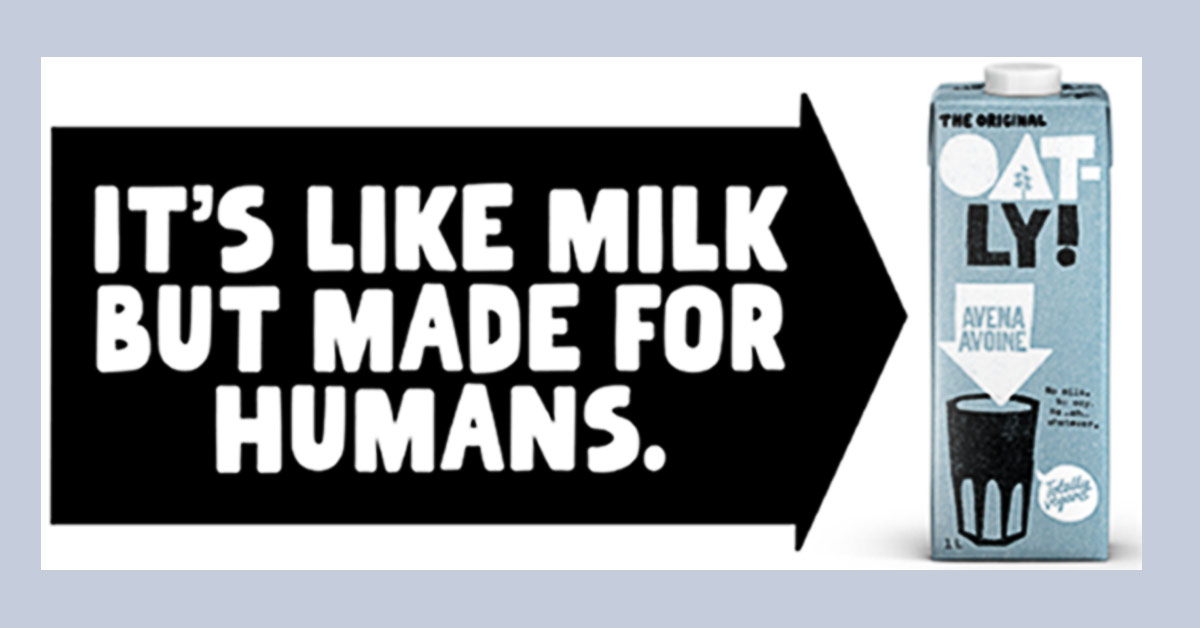
11 May A slogan that has left no one indifferent. Not even the General Court.
With the rise of environmentalism and awareness to take care of the planet, the popularity that alternative products to milk of animal origin has reached is an indisputable reality. One of the beneficiaries of this trend is the Swedish company Oatly, specializing in oat-based dairy substitutes and whose consumption has spread significantly. In fact, Oatly’s advertising is usually quite controversial, since in most of its messages it challenges the traditional dairy industry and, the truth is that this is not the first time it has been in the news.
In 2019, Oatly filed an EUTM application before the EUIPO for the sign “IT’S LIKE MILK BUT MADE FOR HUMANS” and the application was refused for an alleged lack of distinctive character of the claimed slogan, in relation to certain dairy substitutes in class 29, oat-based edible products in class 30 and plant-based beverages in class 32.
Oatly appealed this decision but was also unsuccessful. The Fifth Board of Appeal of the EUIPO confirmed the refusal on the grounds that the applied for expression did not contain any element capable of endowing it with distinctive character and that its length could prevent it from being perceived as a trade mark (i.e., as an indicator of a commercial origin), concluding that “IT’S LIKE MILK BUT MADE FOR HUMANS” was incapable of fulfilling the function of a trademark in respect of the goods it sought to distinguish and was therefore devoid of distinctive character within the meaning of Article 7(1)(b) of EU Trade Mark Regulation 2017/1001, as it merely conveyed a promotional message that non-dairy foods and beverages are similar to milk, but intended for human consumption.
Oatly did not surrender and brought an action before the General Court (Case T-253/20). In its brief, one of Oatly’s arguments was that milk is commonly regarded as an essential element of the human diet and that the slogan applied for as a trademark questions this generally accepted idea. In its judgment, the General Court agrees with this and holds that the mark applied for conveys a message that “will set off a cognitive process” in the consumer.
The message of the applied for expression as a trademark is that milk is not made for humans (but for the offspring of the mammals that produce it) and even hints that it is not even suitable for humans, which is somewhat challenging and makes the slogan as a whole “easy to remember” and “consequently capable of distinguishing” the goods by attributing a commercial origin to them. Consequently, the General Court concludes that the mark applied for has sufficient distinctive character, as required by law.
This decision is certainly a success for Oatly but it also sets a good precedent for future applicants for slogans or advertising expressions because, although the doctrine states that stricter criteria should not be applied to this kind of signs, the reality is that the administrative practice and the case law, when determining the distinctiveness of a slogan, are often more rigorous than when examining conventional word marks.
The food industry is changing and, with it, the messages that companies convey. And with this decision, it seems clear that the General Court has signed up to this change, leading the way towards a new direction in the jurisprudential line which, like the campaigns of Oatly, has left no one indifferent.
If you want to access the full text of the decision, you will find it in the following link:
Written by Isabela Robledo, Lawyer of CURELL SUÑOL SLP



